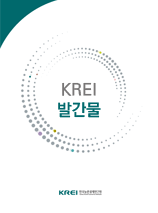요약문
농어촌의 삶의 질을 높인다는 목표 하에 2004년 「농어업인 삶의 질 향상 및 농어촌지역 개발 촉진에 관한 특별법」이 제정되었다. 그리고 해당 특별법에 근거하여 수립되는 삶의 질 향상 기본계획 및 시행계획에 포함된 여러 정책 과제들이 정부 부처별로 추진되고 있다.
계획을 수립하고 정책을 도입하는 일 못지않게 정책의 성과와 한계를 평가하는 작업의 중요성이 높아지고 있다. 농어업인 삶의 질 향상 위원회 전문지원기관 업무의 일환으로 2011년부터 한국농촌경제연구원에서는 삶의 질 향상계획 심층평가 작업을 진행하였다. 삶의 질 향상계획 심층평가는 현행 계획에 포함된 다양한 정책 과제들 중 공통된 목적을 갖는 것들을 동일 정책군으로 묶어서 정책의 정책 형성, 집행 과정, 추진 실적 및 정책 성과 등을 종합적으로 살펴보는 것이다.
이번에 다루는 심층평가 대상 과제는 농어촌의 저탄소 녹색성장 정책과 지역발전 역량 강화 정책 두 가지이다. 첫 번째 과제인 녹색성장은 이명박 정부에서 역점적으로 추진한 정책으로서, 농어촌에서 해당 정책이 어떻게 실행되고 있으며 어떠한 성과가 나타나는지 평가해볼 시점이라 하겠다. 두 번째 과제인 지역 역량 강화는 각종 농어촌 지역개발사업의 성과 제고와 지속 가능한 정책 추진의 밑바탕이라 할 수 있다.
ackground of Research
The purpose of this research is to evaluate policy groups included in ‘Improvement of Quality of Life for Farmers and Fishermen and Rural Development Scheme’. A policy group means a series of programmes or projects concerning a particular objective(There are 22 policy groups about 7 subjects in the scheme). For the year 2012, we evaluated two policy groups; ① Green growth policy for rural areas, ② Local capacity building policy. The evaluation follows the phases of 'policy formation' 'policy execution' - 'policy outcome'.
Method of Research
In order to evaluate the concerning policies, we set up the evaluation framework and the major considerations of each evaluation phase are as follows.
∙policy formation: appropriacy of the objective of the policy group and appropriacy of policy means to achieve the objective
∙policy execution: implementation system of the concerning policy group and efficiency of the executive process
∙policy outcome: result, outcome and ripple effect of the policy group
We used research methods such as literature reviews and statistical analyses about concerning programmes/projects and conducted a surveys of rural residents and local public officials.
Research Results and Implications
① Green growth policy for rural areas
The present policy is restricted to objectives to reduce heating expenses, paying little attention to matters regarding creating green jobs and building systems for rural green growth. And the policy group is lacking sufficient programmes and projects to achieve present goals and objectives. Co-ordination of policy between the central government ministries is not organised well. Rural residents and public officials are lacking awareness of green growth policy.
However, we can find some energy saving effects in farmers who use wood pellet boilers or ground water heat pump system. And more and more people in rural areas are realizing the importance of measures for green growth such as green village making and using of renewable energy.
From the result, we suggest that objectives in Improvement of Quality of Life Scheme policy measures be revised. Considering the goal of improving quality of general rural residents' life, policy measures targeting more people should be strengthened.
② Local capacity building policy
Performance indicators for local capacity building in rural areas which are suggested in the 'Improvement of Quality of Life for Farmers and Fishermen and Rural Development Scheme' are not suitable for measurement of policy outcomes and performance management. And there is lack of policy measures to strengthen the local capacity. Programmes for rural residents' capacity building are mainly adopted in sites which are directly linked to the government funding. Therefore, they have a limited effect on rural capacity building in general.
Horizontal governance based on residents' participation and public- private partnership has been built in only few areas. Expert system to support rural development processes is not effectively working in most regions.
To enhance residents' capacity for rural development, we need a phased system for gradually supporting capacity building activities of rural people. And we should also establish a planning system which link local development plans and capacity building processes in rural areas.
Researchers: Joo-In Seong, Dae-Shik Park, Mi-Hyoung Cho and Young-Gwang Han.
Research Period: 2012.5~2012.12
E-mail Address: jiseong@krei.re.kr
구매안내
KREI의 출판물은 판매 대행사 (정부간행물판매센터)와 아래 서점에서 구입 하실 수 있습니다.
판매대행사
- (주)정부간행물판매센터http://www.gpcbooks.co.kr사이트 바로가기
- 서울특별시 중구태평로 1가 25번지
- TEL 02) 394-0337, 734-6818
- FAX 02) 394-0339
판매서점


